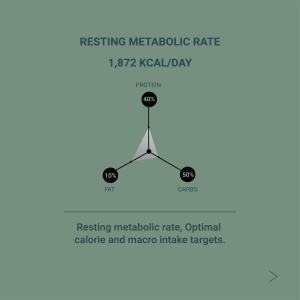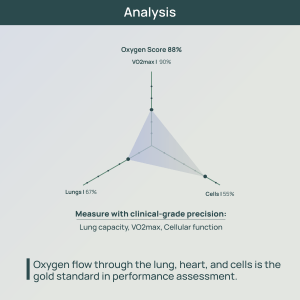Metabolic slowdown and why you should care about it.
You have undoubtedly heard of the term metabolism. Although most people don’t know what it means, it is often the culprit for failed weight loss attempts or general inability to achieve a fitness goal.
This blog from my friends at PNOE explain what metabolism is, why it’s important to maintain it at high levels, and what can cause it to decline.
What is metabolism?
- Metabolism includes all biological processes that convert fuel from nutrients like fats and carbohydrates into the energy our body needs to survive.
- This energy is what we refer to as calories. In simple terms, it’s the process through which we burn calories.
- It is the most vital biological process since it provides a constant supply of the energy needed to power your body movements and all functions keeping you alive such as breathing, blood circulation, cell growth, muscle reparation, etc.
- Metabolism differs significantly from one person to another because of age, genetics, exercise habits, nutrition preferences, medication, etc.
Why it’s important to have a high metabolism.
- A high metabolism means your body burns more calories than the average person with the same age, weight, height, and gender.
- Conversely, having a slow metabolism means you are burning fewer calories than the norm.
- Since weight loss requires a caloric deficit, the state when you eat fewer calories than you burn, having a high metabolism is the most powerful protection against obesity.
- However, besides protecting you from weight gain, having a high metabolism is associated with faster cellular and muscle tissue reparation and other healing processes vital to recovery after training.
- Therefore, a high metabolism is also essential for avoiding injuries.
What can cause my metabolism to slowdown?
Aging, nutrition, and training are the most potent drivers of your metabolism and can all lead to a metabolic decline.
Here’s how each one can affect it.
Age:
- Aging will cause your metabolism to decline since the older we get, the harder it is to maintain muscles mass and the less metabolism-boosting hormones (e.g., growth hormone) we secrete.
- The metabolic decline caused by aging is much less acute than the one nutrition or training can cause, and in most cases, it’s responsible for only a small portion of a person’s weight gain.
- Moreover, despite the decline it causes, training and exercise can help reverse it and maintain your metabolism at healthy levels.
Nutrition:
- Nutrition is one of the most powerful drivers of your metabolism.
- When you reduce the calories you consume and enter into a calorie deficit, the state in which you burn more calories than you eat, your body will reduce its metabolic activities in two ways.
- First, it sheds muscle mass.
- This process occurs since muscles are one of your primary energy reserves that will be tapped upon to cover the calorie deficit caused by food restriction.
- Second, it makes your remaining muscle mass more economical, causing it to burn fewer calories when moving (e.g., walking).
- This is done by changing the balance of specific hormones that regulate the energy your cells burn during movement.
- Both processes are part of your body’s survival mechanism and kick in to conserve calories and help you close the energy deficit caused by restricting food intake.
- However, both can be averted with the correct dose and type of exercise.

Training:
- Training can affect your metabolism in the fastest and most acute way.
- Although it can be a powerful tool for increasing your metabolism, over-training can have the opposite effect.
- The most effective workout type for increasing your metabolism is resistance training.
- First, it increases your muscle mass, leading to more calorie burn as more active tissue requires more energy.
- Second, it increases the energy your muscles burn on a per unit basis, meaning that every pound of muscle mass starts to burn more due to a positive shift in the hormone balance regulating your cells’ energy consumption.
- Too much training, however, has been shown to cause an adverse change in hormone balance (e.g., reduction of growth hormone secretion) that reduces metabolic processes.
- In this case, metabolic decline and the associated decrease in recovery capacity pose a critical danger for injuries.
The struggle to lose weight and maintain it is a common challenge many of us face on our fitness and health journeys. We’ve been led to believe that adopting a healthy lifestyle is the key, but for countless individuals, the results don’t match our sacrifices.

It’s time to uncover the truth.
Recent scientific findings support what many of us have felt: there’s more to weight loss than simple lifestyle changes. Let’s explore the reasons behind the notorious “weight loss plateau” and discover how to overcome it.
A weight-loss plateau occurs when your progress suddenly halts, despite adhering to your nutrition and fitness plan. This frustrating reality affects most people attempting to lose weight, even when diligently following their strategies. So, why does it happen?
When you create a caloric deficit, your body responds by making hormonal adjustments that make it more efficient in burning calories. In simpler terms, it uses fewer calories for the same activities. This reduction in metabolic activity is known as a metabolic slowdown or adaptive thermogenesis.
The famous case study of participants from the TV show, The Biggest Loser, sheds light on the impact of extreme weight loss on metabolism. Despite shedding hundreds of pounds in a short time, most participants regained the weight, and even more alarmingly, their metabolic rate significantly decreased, resulting in fewer calories burned.
The key to successful weight loss is monitoring your daily caloric burn, which is intricately tied to metabolic function. Everyday struggles with weight loss are now understood to be linked to metabolic changes, debunking the misconception that it’s solely a matter of willpower. Your diet and workout plan may not align with your new metabolism.
This is where metabolic testing plays a crucial role. By accurately assessing whether your body has triggered a metabolic slowdown, we can determine the precise caloric intake and workout regimen required to overcome or prevent it.
PNOE breath analysis, our gold standard metabolic measurement, provides valuable insights in a 10-minute test.
With the PNOE test, we can tailor a nutrition plan that aligns with your body’s unique needs, addressing weight loss’s physiological and psychological aspects. It’s not just about sustainable weight loss; it’s about finding peace of mind and redeeming yourself from the misconceptions that have held you back.
What about YOU?
Are you struggling with weight loss and wondering how to achieve sustainable results?
-
Calorie Balance: Creating a moderate calorie deficit is crucial, as consistent energy intake lower than energy expenditure is the foundation for weight loss success.
-
Protein Intake: Ensure a sufficient protein intake through a healthy balanced diet. The exact macronutrient ratios are less important than the overall nutrient balance.
-
Physical Activity: Engage in regular exercise, focusing on a combination of resistance and moderate endurance training. This approach has been proven effective for long-term fat reduction and muscle maintenance.
-
Stress Management and Sleep Optimization: Don’t overlook the impact of stress and sleep on weight loss. High-stress levels and poor sleep quality can disrupt appetite regulation and lead to excessive energy intake.
TEST AND STOP GUESSING!
- A metabolic slowdown can pose a severe obstacle in achieving your dream physique and staying healthy long-term.
- As a result, one of the most important things to monitor is whether your metabolism has slowed down or whether your current fitness and nutrition are causing it to decline.
- The PNOE metabolic analyzer provides a clinical-grade analysis of your metabolism, helping you act early and avoid the pitfalls of a metabolic slowdown.

- Break through weight loss plateaus and unleash your metabolism’s power.
-
PNOE breath analysis is the gold standard for measuring your metabolism, and with just a 10-minute RMR test, we can provide you with a nutrition plan fully suited to your body’s needs, to address both the physiological and psychological aspects of weight loss.
-
Sustainable results are achieved when all aspects of your health and lifestyle are considered.
-
Coach Debbie can help you break through fat loss plateaus, maintain long-term success, and overcome the challenges you may face on your journey.
Sign up for a PNOE breath analysis + Nutritional Therapy Assessment today with Coach Debbie Potts in Solana Beach and discover the plan to transform your weight loss journey.
Wishing you success and fulfillment on your path to a healthier you!
Coach Debbie Potts
